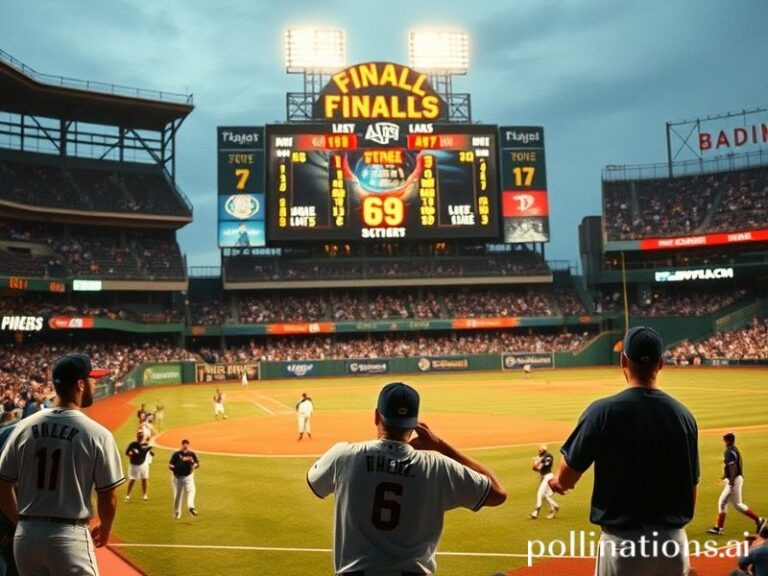Griff McGarry: The 97-mph Metaphor Shipping Worldwide from Philadelphia
Griff McGarry and the Global Ballet of Broken Dreams
By our Special Correspondent in Existential Bullpens
PHILADELPHIA—At first glance, Griff McGarry is just another American pitcher whose fastball once flirted with triple digits and whose elbow now flirts with medical bankruptcy. Zoom out, however, and you find a perfectly serviceable metaphor for the twenty-first-century order: promise cultivated in California suburbs, commodity-fetishized by Asian talent markets, and ultimately hedged by European actuaries who have never seen a baseball but understand risk better than God.
McGarry’s name started ricocheting across international Twitter at roughly the same moment the yen collapsed, European gas prices achieved geosynchronous orbit, and the World Bank politely suggested that Earth might skip a fiscal quarter. Scouts in Taiwan posted slo-mo clips of his slider with captions like “American dream 97 mph” while a Bundesliga physiotherapist in Munich ran Monte Carlo simulations on his ulnar collateral ligament and concluded the probability of catastrophic failure was “somewhere between Italian government stability and the Detroit Lions.” The global supply chain of hope had located its next fragile node.
You see, baseball—like democracy, carbon credits, or gluten-free croissants—is now a transnational product. A 23-year-old with a balky shoulder isn’t merely an athlete; he’s a data packet in an arbitrage ecosystem stretching from Busan to Boca Raton. South Korean hitting academies splice his release-point footage into TikToks set to K-pop. Swiss reinsurers sell cat-bond derivatives whose payout triggers if his ERA exceeds 5.00. Meanwhile, somewhere in Qatar, a sovereign wealth fund calculates how many McGarry rookie cards equal one tank of liquefied natural gas. (Spoiler: fewer every week.)
The pandemic taught the planet that contingency is the only universal currency. McGarry’s 2022 season—6.2 innings, 10 walks, two strikeouts, and a WHIP that resembled the Greek debt-to-GDP ratio—was less a regression than a confession. It confirmed what hedge-fund quants in London already suspected: volatility is not a bug but the operating system. When the Phillies placed him on the minor-league restricted list for “failing to report,” the move trended on Weibo under the hashtag #AmericanWorkEthic, prompting a Shanghai think tank to publish a white paper titled “Comparative Slacking: East-West Labor Discipline in Post-Peak Sports Assets.” The paper was immediately translated into seventeen languages and optioned by Netflix.
In a saner era, a pitcher with command issues would simply learn a sinker and move on. Today he must also navigate geopolitics. MLB’s new collective bargaining agreement quietly inserted a clause allowing teams to offset domestic medical costs by selling “future performance rights” to foreign investors. Translation: if McGarry blows out his elbow again, a consortium of Singaporean dentists owns 4% of his next comeback attempt. Somewhere an algorithm is already pricing the probability that he’ll end up pitching for the Hiroshima Carp while the dentists collect yen-denominated dividends and complain about the exchange rate over golf in Sentosa.
And yet the human element refuses to be fully securitized. Watch McGarry’s recent bullpen sessions—filmed by a drone subcontracted to a Dutch analytics firm—and you’ll notice a tiny superstitious grin when the radar gun hits 96. It’s the same involuntary smile observed on Ukrainian artillery crews when their Soviet-era howitzers actually fire, or on junior bankers in Hong Kong when the crypto market blips green for five consecutive minutes. Fragile, defiant, and utterly irrational: the last rebellion against the empire of expected value.
Whether Griff McGarry ever throws a meaningful pitch again is, in the grand ledger, irrelevant. The planet will keep warming, supply chains will keep snapping, and the Dodgers will still outspend the GDP of Moldova. But somewhere in the cosmic spreadsheet, a cell updates: probability of transcendence, 0.003%. That microscopic chance—measured, traded, and meme-ified across continents—is what passes for optimism these days. And if that doesn’t make you laugh, well, the Swiss have a derivative for that too.







